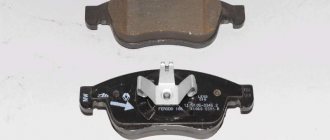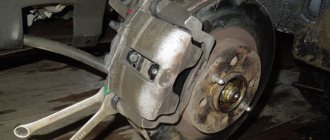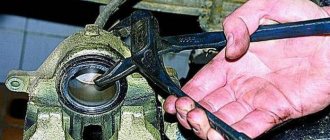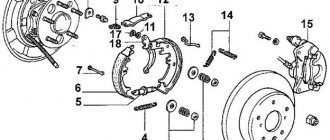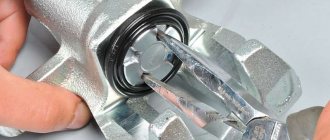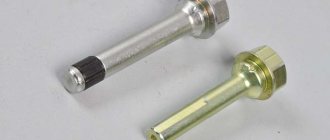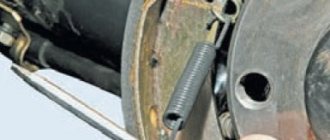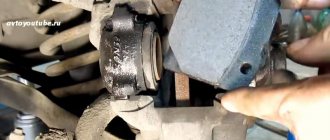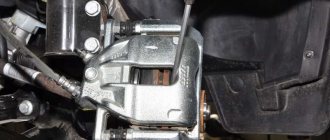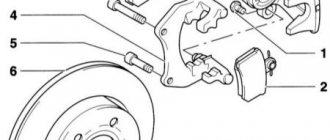The manufacturer does not regulate the frequency of replacement of both front and rear brake pads on Renault Sandero. However, according to car operating experience, replacing the front brake pads is required on average every 25-35 thousand kilometers. The service life of the front brake pads on Renault Sandero depends on the driving style, as well as on the quality of the pads themselves.
2163-5-12-02-08
Using sliding pliers, we completely recess the piston into the cylinder.
If the part of the piston protruding from the brake cylinder prevents the installation of the caliper on the brake pads, completely recess the piston into the cylinder using sliding pliers.
We similarly replace the pads on the other side of the car.
After replacing the pads, press the brake pedal several times to set the gaps between the pads and discs. We check the fluid level in the tank and, if necessary, bring it up to normal.
During operation, the surface of the brake disc becomes uneven, as a result of which the contact area of the new, not yet worn-in pads with the disc decreases. Therefore, during the first 100 km after replacing the pads, until the new pads have broken in, be careful, as the car’s braking distance may increase.
[How to save up to 6,500 rubles on Renault Logan/Sandero maintenance] [Renault Logan/Sandero maintenance for 15 thousand km] [Renault Logan/Sandero maintenance for 60 thousand km] [Renault Logan/Sandero maintenance for 90 thousand km of mileage] [Carrying out maintenance yourself - general recommendations] [Safety rules for doing car maintenance yourself] [Tools required for maintenance of Renault Logan/Sandero] [Replacing the brake pads of the rear wheels of Renault Logan/Sandero]
Replacing the brake pads of the front wheels of Renault Logan/Sandero
How to determine the need to replace pads
When the front pads wear out, you will hear a sharp squeaking sound when you press the brake pedal. This indicates that the pads have reached the maximum permissible thickness of the working surface, or the metal has already begun to wear off. If worn pads are not replaced promptly, they can scratch the brake disc, which will also need to be replaced later.
You can check the wear of the pads using a caliper or visually by eye. We unscrew the wheel and inspect the pads. The maximum permissible thickness of the block must be at least 6mm. If less, such pads need to be changed.
What are the signs of wear?
Everyone understands that after wear, the front brake pads need to be replaced, how can you tell if they are worn out? There are some significant symptoms that make it possible to clearly determine the need for an upcoming pad replacement.
- Along the direction of the parking brake drive lever. This factor is addressed to the rear drums. If the handbrake is not able to hold the car, then the reason may lie not only in the stretched cable. There may be abrasion of the linings. A working hand brake assembly should hold the car on a slope of 160 when the handle is cocked 3-4 clicks. If the desired effect is achieved in 6-7 clicks, then you will receive a guaranteed replacement of the front brake pads.
- Based on the travel of the brake pedal. If the brakes “grab” in the final position of the pedal, this is a significant symptom of lining wear. Here it is recommended not to neglect checking the tubes and cuffs of the brake circuits for their tightness, since the malfunction, as can be seen, is of a dual nature. Lack of tightness is detected by the source of leakage and low fluid level.
- The appearance of squeaks. During a decrease in speed, this effect may be observed. This also indicates the need to check the brake elements. Squeaking does not always appear, but only in cases where the pads have mechanical wear sensors. Such a sensor is a plate, which, after wear of the linings, begins to rub against the working area of the disk. This element is harmless to the brake unit and is not capable of wearing out the corresponding surface of the disc. Squeaking pads are a guaranteed sign of critical wear.
Brake caliper repair kit
If it is necessary to replace the brake cylinder boot or guide pins, below we will indicate the numbers of the original kit and analogues.
- Renault 77 01 208 339 original
- ASAM 32702 analogue
The price of the original can be said to be exorbitant for a repair kit - from 1,700 rubles, but the ASAM analogue costs from 400 rubles. Of course, there is an even simpler option - remove the old boot and look for similar ones. Parts from VAZ cars are often suitable for Renault.
Which pads to choose for replacement
From the factory, Renault Sandero is equipped with original Renault 41 06 021 92R . The cost of the kit at the moment is from 1300 rubles and above. In addition to the original, you can install cheaper analogues, but you should remember that the service life of the analogues is lower than that of the original pads.
Analogs Renault 41 06 021 92R
- Allied Nippon ADB1431 price from 1000 rub.
- AMD AMDBF323 from 750 RUR
- Avantech AV014 from 950 RUR
- Bosch 0 986 467 720 from 1200 rub.
- Fenox BP43002 from 750 RUR
- Finwhale V706 from 700 RUR
- FranceCar FCR210329 from 400 RUR
- Frixa FPE100 from 1000 rub.
- LYNXauto BD6301 from 950 RUR
- Pilenga FDP2885 from 530 RUR
All prices listed above are for a set of 4 pads. All 4 front pads should be replaced at once.
How the system works
Renault Sandero of all modifications has a combined braking system. Disc brakes are installed on the front axle, and drum brakes are installed on the rear wheels. The system is dual-circuit, where the first is the working circuit, the second is the parking circuit.
The brake system of the Renault Sandero hatchback includes the following components: working surfaces (drums, discs, pads), vacuum brake booster, brake cylinder, barrel pipes, pedal system, brake fluid level indicator, ABS unit. So, in this article we will try to figure out exactly how to remove and install the front and, of course, rear pads.
Renault Sandero › Logbook › Replacing the front pads of Sandero 1.4
Ehhh, I haven’t updated the logbook for a long time. Yes, in fact, there was no reason for this - Sanderka runs, the word “at all” does not cause problems. I will never tire of repeating that I love this simple machine.
But the inevitable cannot be avoided - the brake pads are about to expire. When changing shoes to winter tires, I noticed that they had very little left. And now, new pads have been purchased, a day off has been allocated - we’re going to the garage)
Jack up and remove the wheel:
Using a 13mm wrench, unscrew the upper caliper bolt, holding the bushing with a 17mm wrench:
Repeat the same operation for the bottom bolt. We hang the bracket on a wire to the strut spring. To avoid kinking the brake hose:
How cool it is to service a new car! Both bolts came out without any problems. I remember with a shudder how much effort the same procedure cost me on my former 93-year-old Pajer... Sheer hell. I foresee comments: “Why did you unscrew both bolts, you could only use the bottom one! AHAHAHAHA LOOOOH!”, so a small clarification: I don’t know how this car was serviced before me, so if I go somewhere, I’d better disassemble everything as much as possible, lubricate it and put it back together, and I’ll know that there are no surprises there. The wear of the pads is uniform, the thickness of the friction lining is still about 3 mm. But why wait for “metal on metal”, especially since new pads do not cost astronomical sums:
Installing new consumables for the system
Before performing the procedure for installing new brake pads on Renault Sandero, you should use a jack to lift the car, and the car must be securely secured. Then, using a large flat-head screwdriver with a certain amount of force, move the pad to the maximum possible distance from the disc. After this, the lower bolt securing the front axle wheel mounting assembly is removed. For this purpose, an open-end wrench No. 17 is used, holding the guide part. Wrench No. 13 is used to unscrew the bolt itself. After unscrewing the bolts, you need to turn the caliper housing up and remove the used brake pads from their original places. You must first clean the surfaces where the brake pads were and ensure the safety of the springs for their spacers. A similar list of work can be carried out independently without any problems, including on the front pads. In this case, no special experience or knowledge of the technology of performing the procedure is required. Replacing outdated brake pads directly with new ones is not at all difficult. The car owner can replace it himself.
Instead of old Renault Sandero spare parts, new brake pads are installed, both front and rear, and the assembly process is performed in reverse order. The modern automotive spare parts market offers a significant selection of analog parts for the system.
Renault Sandero hatchback car owners usually use brake pads from the following brands: TEXTAR (TX 2146303/2146318234), RH (2141.32), Ferodo (FE fdb845) and TRW (gdb400).
The first step is to remove the wheel on a raised car when dismantling the rear drums. The Renault Sandero parking brake cable should be released a little. Using a wide flathead screwdriver and a hammer, knock out the metal plug needed to protect the retaining nut. Using a 30mm open-end wrench, unscrew the large nut and use a special device to dismantle the drum. In this case, the possibility of disassembling the wheel bearings should be excluded. Otherwise it will have to be replaced. To remove the brake pads from the drum on a Renault Sandero, you will need to perform turning movements to loosen their fastenings. They look like threaded dowels that secure the shoe to the surface of the drum. For example, the front pads are moved in different directions using a screwdriver and they are removed from the drum. Installed new spare parts are compressed by a spring and placed in basic locations. Assembly is performed in reverse order.
Stocking up on tools
Before replacing the front brake pads, we arm ourselves with the following set:
- wrenches (socket heads, ratchet, etc.);
- a screwdriver with a slotted profile;
- a sprayer required to be able to clean the brake elements, if we are talking about replacing these parts on the rear axle mechanisms;
- a universal product such as “WD-40”;
- jack and safety stand;
- syringe (preferably larger volume);
- brake fluid;
- pliers;
- gloves (recommended).
- Do not forget to study the detailed instructions on how to change the pads.
It is not advisable to try to save money when purchasing pads. Cheap analogues may contain asbestos in their structure. It is determined simply by the white marks on the surfaces of the friction linings. The efficiency of such pads is quite low, and wear resistance tends to zero. You should also avoid pads with increased thickness of the linings, since the likelihood of their intense abrasion (faster than the original ones) is very high.
Renault Megane 2 stabilizer bushings which are better
We select tools so that replacing the rear brake pads of Renault Sandero goes smoothly
To successfully replace the Renault Sandero brake pads, prepare in advance a 13 mm spanner made of good quality material, a special 17 open end wrench, and for working with deep fastenings you will need a regular screwdriver with a flat and wide tip to grab the necessary elements. To work with brake fluid, it may be worth using a thin transparent hose or a medical bulb to pump out excess fluid in the system.
Spanner
During operation, the machine must be standing either on a lift or on jacks. So it’s worth considering the car’s fixation system, all the approaches to the brake system, so that replacing the Renault Sandero rear brake pads can be done without any hitches or unnecessary surprises.
Jack
You may also need a metal brush, which will have to remove all layers of dirt and corrosion from the caliper body in order to prepare the seats for the pads. Fixed vices are also prepared in advance; they will allow you to fix small parts on which repair and maintenance work will be performed.
